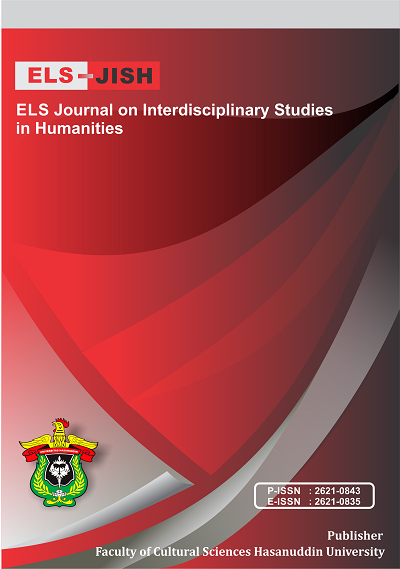English Teachers’ Perspectives and Understandings Towards Critical Literacy Practice in EFL Context
DOI:
https://doi.org/10.34050/elsjish.v7i2.35035Keywords:
Critical literacy, Critical pedagogy, EFL teachers’ perspectivesAbstract
The ideology and socio-political viewpoints of writers significantly shape text and language products. Hence, students engaging in literacy tasks, such as reading and writing, should approach them with a critical mindset, considering various perspectives rather than accepting information uncritically. Critical literacy pedagogy addresses these requirements, aiming to cultivate critical literacy skills in students with the guidance of teachers, who themselves must possess critical thinking abilities and literacy. This study explores English teachers' perceptions and grasp of critical literacy pedagogy. Sixty teachers participated, responding to questionnaires comprising both closed and open-ended questions, alongside brief interviews. The data obtained, quantitative and qualitative, were analyzed through mathematical computations and coding techniques respectively, revealing teachers' positive attitudes toward critical literacy pedagogy. However, this enthusiasm wasn't consistently reflected in its implementation due to cultural beliefs and insufficient teacher knowledge. Consequently, the study recommends professional development opportunities for teachers to enhance their understanding and proficiency in incorporating critical literacy pedagogy, particularly within EFL contexts.
References
Baker, E. A. (2001). The nature of literacy in a technology‐rich, fourth‐grade classroom. Literacy Research and Instruction, 40(3), 159-184.
Blaisdell, N. (2023). SFL, Critical Literacy, and Social Justice: Apprenticing Students to the Language of Persuasion as a Pre-service Teacher. In In Pursuit of a Multilingual Equity Agenda (pp. 210-232). Routledge.
Creswell, J. W. (2002). Educational research: Planning, conducting, and evaluating quantitative. Boston: Pearson Education Inc.
Crookes, G., & Lehner, A. (1998). Aspects of process in an ESL critical pedagogy teacher education course. Tesol Quarterly, 32(2), 319-328.
El Soufi, N., & See, B. H. (2019). Does explicit teaching of critical thinking improve critical thinking skills of English language learners in higher education? A critical review of causal evidence. Studies in educational evaluation, 60, 140-162.
Freire, P. (2020). Pedagogy of the oppressed. In Toward a sociology of education (pp. 374-386). Routledge.
Gardner, P. (2018). Writing and writer identity: The poor relation and the search for voice in ‘personal literacy’. Literacy, 52(1), 11-19.
Gustine, G. G., & Insani, H. N. (2019). English students’ experience of reframing narrative stories from a critical literacy perspective. Indonesian Journal of Applied Linguistics, 8(3), 691-696.
Hidayat, R. A. U. (2020, April). An inquiry study on teachers’ beliefs and knowledge of critical literacy pedagogy in Indonesia context. In Twelfth Conference on Applied Linguistics (CONAPLIN 2019) (pp. 155-159). Atlantis Press.
Janks, H. (2010). Literacy and Power. New Tork: Rouledge.
Junaid, Nahdhiyah, Dahlan, Andini, C., & Dzulhijjah, A. M. (2024). The Portrayal of African Woman’s Struggle Reflected in the Novel “How Beautiful We Were” By Imbolo Mbue (2021). ELS Journal on Interdisciplinary Studies in Humanities, 7(2), 275-284.
Lewison, M., Leland, C., & Van Sluys, S. (2002). Taking on critical literacy: The journey of newcomers and novices. Language Arts, 79(5), pp. 382-392.
Low, D. E., Lyngfelt, A., Thomas, A., & Vasquez, V. M. (2021). Critical literacy and contemporary literatures. In The Handbook of Critical Literacies (pp. 308-316). Routledge.
Luke, A. (2018). Critical literacy, schooling, and social justice (pp. 28-74). New York, NY: Routledge.
Luke, A. (2018). Two takes on the critical. In Critical literacy, schooling, and social justice (pp. 216-224). Routledge.
Luke, A., & Freebody, P. (1997). Shaping the social practices of reading. In M. Sandy, L.Alan & F. Peter (Eds.), Constructing critical literacies, Cresskill, NJ:Hampton, pp. 185-223.
Machin-Mastromatteo, J. D. (2021). Transforming reference work into teaching: From a librarian to an information literacy-oriented university professor. In Future Directions in Digital Information (pp. 235-264). Chandos Publishing.
Mayes, E. (2006). Teachers’ Attitudes to Critical Literacy: Multiple Voices (Unpublished thesis). University of Sydney, Sydney.
Novianti, N., Thomas, A., & To, V. (2020). Addressing challenges in the practice of critical literacy in EFL classrooms: A new framework. University of Tasmania.
Rahman, F., Akhmar, A. M., Hasyim, M., Dalyan, M., & Rahman, F. F. (2022). The Virtue In Core Values of Buginese Culture: A Worldview from Philosophical, Religious, and Moral Perspectives. Al-Qalam, 28(2), 197-207.
Seaboyer, J., & Barnett, T. (2019). New perspectives on reading and writing across the disciplines. Higher Education Research & Development, 38(1), 1-10.
Shor, I. (1999). What is critical literacy. Journal for Pedagogy, Pluralism & Practice, 4(1), 1-26.
Silvhiany, S., Huzaifah, S., & Ismet, I. (2021). Critical digital literacy: EFL students’ ability to evaluate online sources. Indonesian Journal of EFL and Linguistics, 6(1), 249.
Wade, S., Thompson, A., & Watkins, W. (2019). The role of belief systems in authors’ and readers’ constructions of texts. In Beliefs about text and instruction with text (pp. 265-294). Routledge.
Wardani, D. M. Y. (2021). The implementation of critical literacy approach towards EFL college students. Journal of Educational Study, 1(1), 46-59.
Weda, S., Rahman, F., Atmowardoyo, H., Samad, I. A., Fitriani, S. S., Said, M. M., & Sakti, A. E. F. (2022). Intercultural Communicative Competence of Students from Different Cultures in EFL Classroom Interaction in Higher Institution. International Journal of Research on English Teaching and Applied Linguistics, 3(1), 1-23.
Downloads
Published
How to Cite
Issue
Section
License
Copyright (c) 2024 Nur Ijabah, Asdar Asdar

This work is licensed under a Creative Commons Attribution-ShareAlike 4.0 International License.






